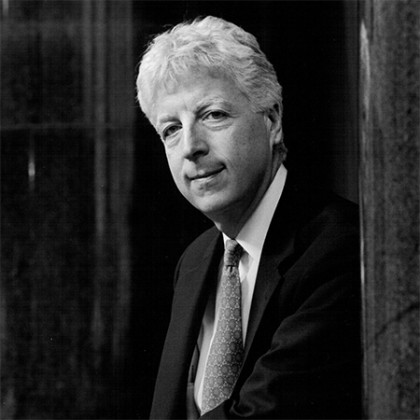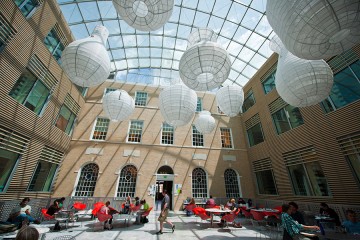For Jonathan Cole, the landscape of higher education in America—with its constant shifts and innovations—provides endless inspiration for new ideas. At present, the sociologist is at work on three new books and an education podcast.

Image caption: Jonathan Cole
Those are the latest additions to a body of scholarship that has established the Columbia professor and former provost as one of the country's leading thinkers on higher education reform. In his latest book, Toward a More Perfect University, Cole presented a roadmap for how universities may evolve in the 21st century.
On Tuesday afternoon, Cole will visit Johns Hopkins University to discuss current trends and challenges in undergraduate education. The town hall event—from 3:30–5 p.m. in Levering Hall's Arellano Theater—will be hosted by CUE2, the university's second Commission on Undergraduate Education, which launched in April.
In advance of that event, Cole spoke with the Hub about the challenges facing universities today and the future of higher education in America.
Your writings have emphasized Johns Hopkins as the critical foundation for the American research university, historically. In what ways do you see those formative ideas still alive today—and what concepts have shifted most?
I think in order to be one of the world's preeminent and great universities, you have to continue to follow the Hopkins model to some significant degree. You can't be a great research university without producing research that changes the world, whether that be in medicine, engineering, the social sciences, the humanities, and so on. So that core idea of the Hopkins tradition is still very alive and with us.
But over the years some tweaking has been done, and most of it is for the good. For example, there's increased appreciation of scholarship without borders, so students can roam the curriculum more than in the past. And many top research universities today are giving more weight to undergraduate research, where students can proceed at their own growth rate rather than by class year.
But it's also essential for places like Hopkins and Columbia and the great original research universities to place undergraduate education and the liberal arts at the very heart of the university. That doesn't mean research should be diminished, but for the welfare and economic well-being of the university, it's important to think of undergraduate education as the core.
What are some of the new challenges universities face that weren't present a few years ago?
There's been enormously diminished support by state and federal governments for higher education. I think public universities have been hurt the most, but great privates like Hopkins have been hurt by leveled-off support for research, and by government intrusion in internal affairs, particularly in attempt to limit certain types of research and even abridging aspects of academic freedom.
And I think the breakdown of trust between a federal government and universities has become acute. We've seen a very sharp rise in the regulation of research and efforts to control the curriculum. There are now well over 1,000 regulations of university-based research, to the point where many principal investigators or scientists are spending a good percentage of their time on compliance instead of producing new ideas. And the government has attacked various forms of research, like climate change and certain political science work that's not directly related to national defense.
One of our goals, I think—which I'm not sure you'll get during the current White House administration—is to rebuild the trust that existed between major research universities and the government after World War II, when universities were held in the greatest public esteem. I'm afraid that's no longer case.
For universities like Hopkins that are embedded in urban settings, how should they be thinking about the relationship between their campuses and their home cities?
While we can't be city or state governments, we can do our share to enhance the quality of education and the quality of life in surrounding neighborhoods. I think what Hopkins and others are doing represents a big step in the right direction. The walls between cities and universities are being broken down in very useful, constructive, and meaningful ways.
We've seen Hopkins more involved in the welfare of Baltimore and its neighborhoods, through both student efforts and the leadership of your president, Ron Daniels. The University of Pennsylvania has done remarkable work broadening outreach to support local public schools and to improve certain neighborhoods. The same can be said of places like the University of Southern California and Arizona State University.
And I dare say, even Columbia—which historically was almost a walled-in city in its old campus, though not its new campus going up—has broken down those barriers and achieved a much better relationship with Harlem and other neighbors. And it has also taken a very active role in the welfare of local universities, many in economically distressed communities.
You've expressed some skepticism that new technology could be a massive disrupter for university education. Can you elaborate?
Let me speak to the new craze for the use of technology and distance learning as a new economic model for universities. Many expected that somehow MOOCs [Massive Open Online Courses] and other forms of new technology would be a magic bullet that would reorganize higher learning. Thankfully, many academic leaders and faculty now doubt that will be the case, at least for places like Hopkins. Historically, new technologies have been introduced to higher learning and have had an impact—but they haven't been the disruptive technologies we hear about from business school professors who have made a living off of these kinds of prognoses.
Remember before MOOCs we had correspondence courses; we had television lectures, like Sunrise Semester on CBS; we've had digital libraries and digital classrooms, and remotely taught professional development courses. These have all benefited higher learning, but they haven't reduced the importance of "brick and mortar" at top universities. As of yet certain types of learning and educational experiences cannot be had by use of machine learning.
Our greatest hope, so far unfulfilled, has been that digital learning would have a democratizing effect—reaching people all over the globe who have the means to access high-speed internet and a good computer, but who do not have the opportunity to study at a place like Hopkins.
Cole will speak at CUE2's town hall event on Tuesday from 3:30–5 p.m. in the Arellano Theater in Levering Hall. More details on CUE2's mission on undergraduate education are available on the Office of the Provost website.
Posted in Student Life, Voices+Opinion, Politics+Society
Tagged education reform, higher education, undergraduate education








